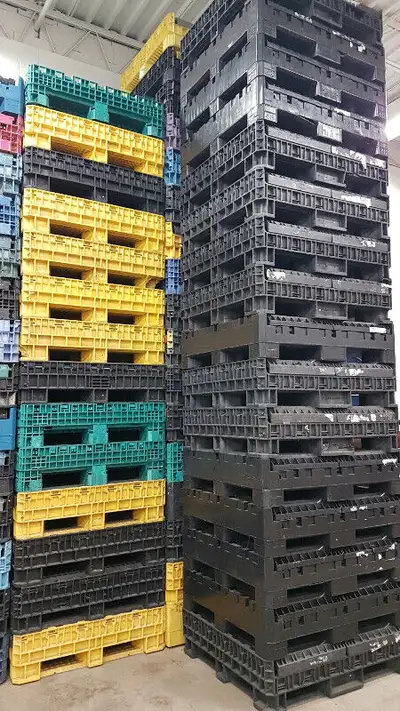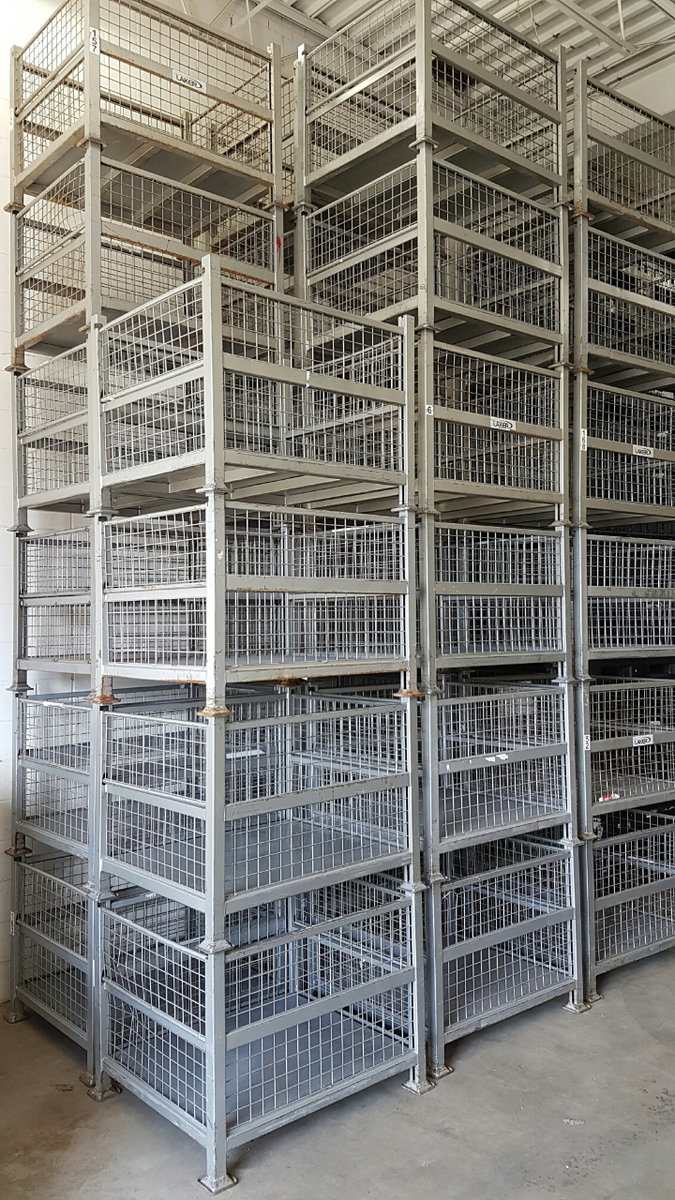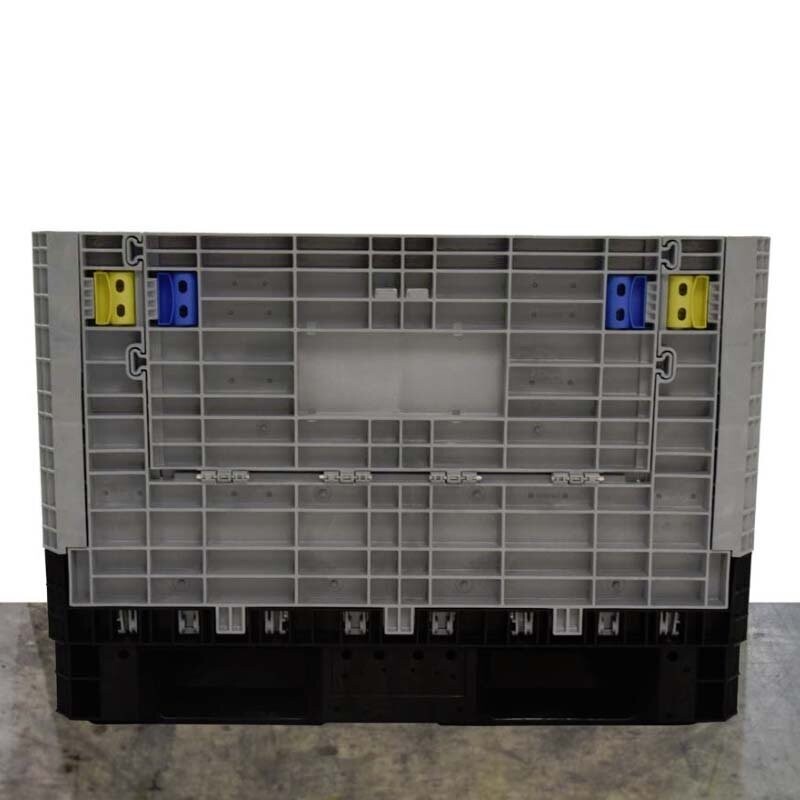How used bulk containers improve storage efficiency across industries
Wiki Article
Why Bulk Containers Are Necessary for Cost-Effective and sustainable Transport
Mass containers play a necessary function in modern-day logistics. They facilitate the efficient movement of large quantities of items, therefore optimizing transportation procedures. This technique not just minimizes prices but likewise minimizes environmental influence via reduced exhausts and waste generation. As markets look for more sustainable methods, the adoption of bulk containers is becoming increasingly considerable. What ramifications does this shift hold for future logistics and supply chain monitoring?
The Advantages of Utilizing Mass Containers in Logistics
Bulk containers reinvent logistics by improving effectiveness and sustainability. These containers enable the transportation of big amounts of items in a solitary trip, substantially reducing the number of trips needed. This not just improves operations however likewise decreases labor prices associated with handling, loading, and unloading. On top of that, mass containers are designed to enhance area application within transport cars, making sure that even more items can be delivered simultaneously.The standardization of bulk containers also simplifies the logistics procedure. With consistent measurements, they can be easily stacked and stored, resulting in improved storage facility administration. In addition, mass containers often include resilient products that safeguard contents from damages throughout transportation, therefore reducing product loss and increasing total integrity. Because of this, services can experience boosted supply chain performance, eventually resulting in raised profitability and consumer satisfaction. This combination of aspects makes mass containers a crucial property in modern logistics.
Environmental Effect: Reducing Waste and Carbon Footprint
As sectors increasingly focus on sustainability, the adoption of mass containers has become a key approach for reducing waste and decreasing carbon impacts. These containers lessen the use of product packaging materials, such as boxes and plastic, thereby notably lowering general waste generation. By consolidating shipments, mass containers boost transportation performance, enabling even more products to be delivered per trip. This decrease in trips directly associates with reduced greenhouse gas discharges, adding to a smaller sized carbon impact.Moreover, mass containers can typically be recycled or reused, further reducing ecological effect. The resilience of these containers warranties they can withstand multiple transport cycles, decreasing the demand for single-use choices. used bulk containers. By simplifying logistics and promoting reliable source use, mass containers not just sustain sustainable methods yet additionally urge sectors to align with international ecological objectives. Inevitably, their implementation reflects a dedication to ecological stewardship and responsible resource management
Expense Savings: How Mass Containers Lower Transport Costs
While lots of business seek ways to boost their bottom line, using bulk containers offers a significant opportunity for lowering transport expenses. Bulk containers maximize the quantity of products moved, allowing businesses to ship bigger amounts simultaneously. This effectiveness reduces the variety of trips needed, directly decreasing gas expenses and lessening labor costs linked with loading and unloading.In addition, bulk containers commonly feature streamlined designs that optimize area utilization within transport automobiles. This means fewer voids, bring about more efficient use of readily available ability. The toughness of bulk containers can reduce the risk of product damage throughout transit, making certain and decreasing losses that even more items show up intact.
Enhancing Supply Chain Effectiveness With Mass Storage Solutions
Bulk storage space solutions play a necessary role in improving supply chain effectiveness by optimizing stock monitoring. By settling goods into fewer, larger containers, organizations can substantially reduce managing prices associated with frequent transfers and processing. This streamlined technique allows for far better tracking and administration of supply, inevitably leading to enhanced operational efficiency.Structured Stock Administration
Effective inventory monitoring is vital for enhancing supply chain procedures, particularly when companies take on bulk storage space solutions. These remedies enable services to keep higher stock levels while minimizing the regularity of replenishment. By consolidating materials into bulk containers, companies can improve their inventory processes, lowering the complexity associated with tracking several smaller sized bundles. This method promotes exact inventory matters and improves projecting accuracy, allowing for more enlightened decision-making. In addition, mass storage space options simplify storehouse organization, making it easier to locate and access items when required. As an outcome, organizations can accomplish an extra efficient inventory turnover rate, ultimately boosting general supply chain efficiency and lowering the possibility of stockouts or overstock scenarios.
Reduced Handling Expenses
The execution of bulk storage space remedies not just improves stock monitoring but likewise substantially decreases taking care of costs throughout the supply chain. By settling materials right into mass containers, companies reduce the demand for constant handling and transfer in between various storage and transport devices. This approach reduces labor prices associated with loading, unloading, and moving smaller plans. Additionally, bulk storage decreases the regularity of deliveries, bring about lower transportation costs and reduced gas consumption. As a result, companies can enhance their logistics procedures, permitting for an extra efficient allocation of resources. Ultimately, reduced dealing with costs add to enhanced overall supply chain efficiency, fostering an environment that supports both sustainability and economic feasibility.
Flexibility of Bulk Containers Throughout Different Industries
Although several industries have distinctive demands for transportation and storage, mass containers have arised as a versatile remedy that meets a wide variety of requirements. These containers, ranging from big containers to specialized tanks, can accommodate diverse products, consisting of powders, granules, and liquids. In the agricultural industry, bulk containers facilitate the transportation of plant foods and grains, while the food and drink sector uses them for active ingredients and ended up items. The chemical sector counts on mass containers for securely transporting dangerous products, making certain compliance with safety and security guidelines. Additionally, construction firms gain from mass containers for transporting aggregates and other materials. Their adaptability encompasses various modes of transportation, consisting of vehicles, ships, and trains, boosting logistical performance. This convenience not just simplifies procedures throughout different industries however also promotes sustainability by reducing product packaging waste and maximizing area en route. Mass containers play an essential function in modern-day supply chain monitoring.Future Patterns in Bulk Container Use and Sustainability
The future of bulk container usage is significantly formed by ingenious materials growth that improves sustainability. Additionally, automation in logistics promises to simplify procedures, decreasing waste and improving performance. Accepting circular economic climate methods will further change exactly how bulk containers are developed, made use of, and recycled, fostering an extra sustainable transportation landscape.Cutting-edge Materials Development
As markets increasingly focus on sustainability, cutting-edge products advancement in mass containers becomes a significant consider improving environmentally friendly transport remedies. Producers and researchers are checking out eco-friendly plastics, recycled compounds, and lightweight metals to decrease environmental impact. These products not only reduce waste yet likewise boost gas efficiency by reducing the general weight of containers. In addition, innovations in smart materials, which can adapt to varying problems, boost the resilience and performance of mass containers. The combination of these cutting-edge products aligns with circular economic situation concepts, advertising reuse and recycling. As the need for lasting techniques expands, the growth of such materials will certainly play an important function in forming the future of bulk container usage in logistics and transportation.Automation in Logistics
Considerable innovations in automation are poised to transform logistics and the usage of bulk containers, boosting sustainability in transport. Automated systems, including drones and self-governing vehicles, are enhancing the activity of mass containers, reducing the dependence on traditional fuel-powered transport. These technologies optimize routing and loading processes, decreasing empty miles and improving gas performance. In addition, automated supply administration systems improve tracking and monitoring of bulk containers, making certain better source appropriation and lowered waste. The combination of the Web of Things (IoT) allows real-time information evaluation, allowing proactive decision-making that aligns with sustainability goals. As automation continues to advance, it is expected to drive further technologies wholesale container use, eventually supporting even more lasting logistics practices and decreasing the ecological effect of transport.Round Economy Practices
Advancements in automation are establishing the stage for a much more incorporated method to circular economy techniques in the domain of mass container use. As industries significantly embrace sustainability, bulk containers are being designed for durability and reusability. This change not just lessens waste yet also improves source efficiency. Business are taking on strategies such as closed-loop systems, where utilized containers are accumulated, refurbished, and reintroduced right into the supply chain. Additionally, wise modern technologies track container life cycles, helping with far better management and decreasing ecological influence. The collaboration between manufacturers, logistics providers, and end-users is necessary in establishing requirements for sustainable container usage. refurbished bulk containers. Future fads show an expanding emphasis on products that are biodegradable and recyclable, additional strengthening the circular economic situation's principles wholesale transportation
Frequently Asked Questions
What Materials Are Bulk Containers Usually Made From?
Mass containers are usually created from resilient products such as high-density polyethylene, light weight aluminum, steel, and cardboard. These materials supply convenience, security, and strength, making them appropriate for delivering numerous goods in different markets effectively.Exactly how Do I Select the Right Dimension Mass Container?
Selecting the ideal dimension mass container entails assessing the quantity of materials to be transferred, taking into consideration dealing with devices compatibility, and evaluating storage room needs. Correct dimension warranties performance in transport and lessens waste throughout delivery.Are Bulk Containers Reusable or Recyclable?
Bulk containers are usually recyclable, made for several journeys, improving sustainability. Lots of can also be reused, depending on the products made use of. Selecting recyclable options further sustains ecological goals more info and reduces waste in transport methods.What Safety Rules Relate To Bulk Container Transport?
Security policies for bulk container transport include conformity with the Division of Transportation guidelines, proper labeling of unsafe materials, structural integrity assessments, and adherence to weight limits to guarantee safe handling and prevent crashes during transportation.Exactly How Can Services Change to Using Mass Containers Effectively?
Organizations can alter to bulk containers by assessing existing logistics, training team on handling, buying ideal devices, optimizing stock monitoring, and collaborating with distributors to guarantee compatibility and effectiveness throughout the supply chain.
As sectors progressively focus on sustainability, the adoption of bulk containers has actually emerged as an essential method for reducing waste and reducing carbon impacts. By consolidating materials right into mass containers, business can enhance their supply processes, lowering the complexity connected with tracking numerous smaller packages. As markets increasingly prioritize sustainability, ingenious products growth in bulk containers emerges as a considerable variable in enhancing environmentally friendly transport services. Automated systems, including drones and independent cars, are streamlining the movement of bulk containers, lowering the reliance on conventional fuel-powered transportation. In addition, automated inventory management systems improve monitoring and monitoring of bulk containers, making sure much better resource allotment and minimized waste.
Report this wiki page